Menopause treatment & management | Dr Anu Mahadik | Sydney gynaecologist
Menopause treatment | Sydney gynaeologist Dr Anu Mahadik
What is menopause?
What are the symptoms of menopause?
Almost all women going through menopause experience symptoms. As you begin to approach menopause your ovaries begin to slow down the production of oestrogen and progesterone. During this time your hormone levels tend to fluctuate and you may notice menstrual cycle irregularities, including:
- Shorter, longer or totally irregular periods
- Lighter bleeding
- Unpredictable and heavy periods
Some symptoms that you may have during menopause include:
- Hot flushes
- Night sweats (including waking up hot and sweaty)
- Tiredness
- Aches and pains
- Headaches
- Reduced sex drive
- Tiredness
- Forgetfulness
- Irritability
- Lowered self-esteem
- Crawling sensations under the skin or itching
- Difficulty sleeping including wakefulness
- Increased urinary frequency
- Vaginal dryness and discomfort during vaginal intercourse
Menopause management | Sydney gynaeologist Dr Anu Mahadik
Menopause Symptom Management
Most women find these symptoms are manageable and do not have treatment. When symptoms are particularly severe or prolonged, there are a range of ways to manage them.
Through:
- Healthy diet including limiting caffeine and alcohol and increasing calcium
- Exercise, particularly weight-bearing and strength training activities to prevent bone density loss and keeping your bones healthy. Exercise also improves balance to reduce the risk of falls and injury.
- Looking after your mental health
- Reducing stress
- Getting enough good quality sleep
- Avoiding things that that trigger your hot flushes and sleeping with light-weight pajamas and bedding
- Quitting smoking as it increases the risk of osteoporosis, heart disease and lung cancer.
- If your symptoms are particularly bad you may require hormone replacement therapy (HRT)
If you are not a candidate for HRT because of past breast cancer, heart disease or clots you may be prescribed medications that control symptoms instead, such as:
- Antidepressants for mood
- Medication for migraines and blood pressure

Hormone replacement treatment | Sydney gynaeologist Dr Anu Mahadik
HRT
Hormone replacement therapy reduces many of the side effects of menopause. If you have moderate to severe symptoms it may be appropriate for you. If you have undergone early menopause HRT will be recommended until you turn 50, unless there is a health reason to avoid doing so.
Your doctor will be able to help you determine what form of HRT is right for you. The benefits typically outweigh the risks of HRT for most women. You may have HRT in the form of tablets, a patch or gel applied to your skin, a vaginal pessary (tablet) or vaginal creams if your vaginal or urinary symptoms are severe.
Some women have severe symptoms of menopause for more than 10-years you need long term HRT. You should have annual check-ups to assess the risks and benefits of HRT therapy for you.
Menopause treatment | Sydney gynaeologist Dr Anu Mahadik
Postmenopausal bleeding
What causes postmenopausal bleeding?
Postmenopausal bleeding can be caused by:
- Thinning or inflammation of the vaginal lining (called atrophic vaginitis)
- Thinning of the uterus lining
- Polyps on the cervix or uterus. These are not usually cancerous
- Thickened endometrium because of HRT
- Abnormalities of the cervix or uterus.
- Cancer of the cervix or uterus (rare)
Bleeding can be investigated through a physical examination, blood test, ultrasound, cervical screening test, biopsy, hysteroscopy or D&C (dilation and curettage) to scrape away and test part of your endometrium. The latter is done under general anaesthetic.
Treating postmenopausal bleeding
The treatment you will need depends on the underlying cause of the bleeding:
- HRT or other medications
- Surgery to remove polyps
- Cancer treatment if necessary
Menopause treatment | Sydney gynaeologist Dr Anu Mahadik
Frequently asked questions about menopause
Most women reach menopause between 45 and 55. If you go into menopause before 41 it is considered ‘early menopause’.
Once your hormone levels fall below a certain point your ovaries will stop releasing eggs. At this point your periods will stop and menopause will have been reached. You will know you have reached menopause if it has been 2 years without a natural period if you are under 50 and 1 year if you are over 50.
As you will have a decrease in female hormones after menopause you have increased risks of:
- Osteoporosis (thinning of the bones) and therefore fractures
- Heart attack and heart disease
- High blood pressure and stroke
Sydney Obstetrician Norwest and St George Private Hospitals
Consulting in Westmead and Kogarah
My consulting rooms are in Westmead. If you are preparing for your antenatal care and looking for the best and most suitable solution, you can count on my practice to help you.
If you live in the Sydney CBD, or south of Sydney, you may be best served by coming to my rooms in Kogarah, at St George Private Hospital Medical Suites.
I am affiliated with Norwest Private Hospital, St George Private Hospital and Westmead Private Hospital.
Westmead Private Hospital welcomes over 2,300 babies into the world each year. They demonstrate a leading and innovative approach to outcome-focused care for women and their families prior to, during and after childbirth.
New parents will enjoy the modern conveniences and perks of a luxury hotel when they experience Westmead Private Hospital’s maternity unit, which has a strong emphasis on assisting new families in the journey of parenthood, with comprehensive postnatal education provided by their maternity team.
They have the unique advantage of being co-located with both Westmead Hospital and Westmead Children’s Hospital. This allows us to provide our patients with the highest standard of private care whilst having access to tertiary level care facilities if required (*access to Neonatal Intensive Care at Westmead Hospital and Westmead Children’s Hospital is dependent on bed availability).
The Maternity Unit comprises:
- 8 birthing suites
- 46 bed antenatal/ post natal unit
- 14 cot Special Care Nursery
- 8 spacious Parenting Suites (additional costs apply)
- Women’s only Infant Feeding Support Centre supported by experienced clinicians
- Education Centre
- Bathing Centre
- Rooftop garden for the whole family to enjoy
- All private rooms with ensuite
Guaranteed Private Room
Westmead Private Hospital is pleased to offer all of our maternity patients the guarantee of a private room following the birth of their baby. One support person is welcome to stay free of charge.
More information on the maternity services at Westmead Private Hospital.
I come from a family of doctors and it has always been my intuitive first choice to become an Obstetrician and Gynaecologist. I basically grew up in it, with my father being one of the co-founders of a series of IVF clinics in India. Care for mothers and the babies they are expecting has always been my first nature and I am grateful for being able to serve my patients in their journey.
So if you are in that phase where you are not sure how to choose a private obstetrician in Sydney, let’s have a chat so we can plan your antenatal care together.
